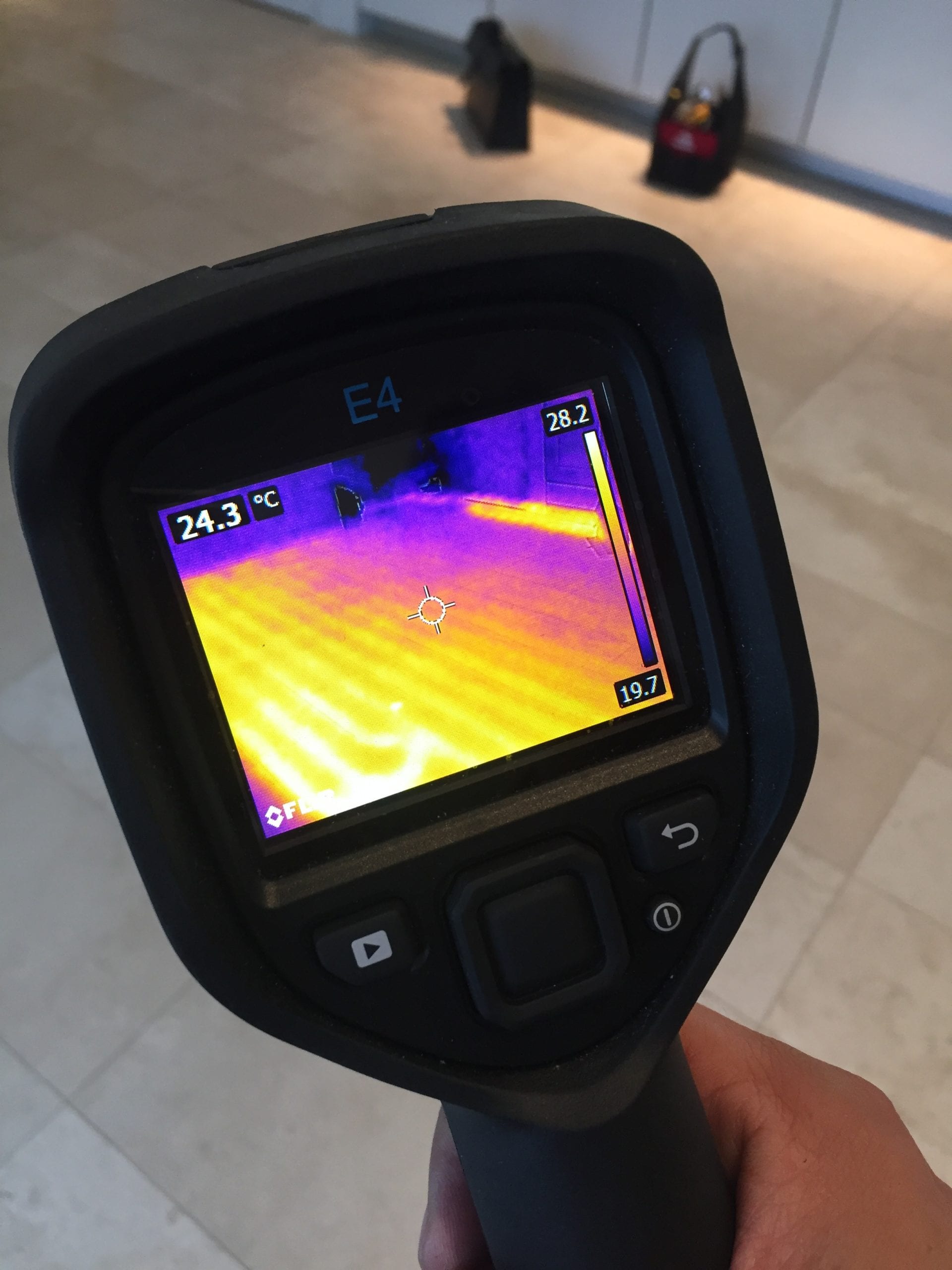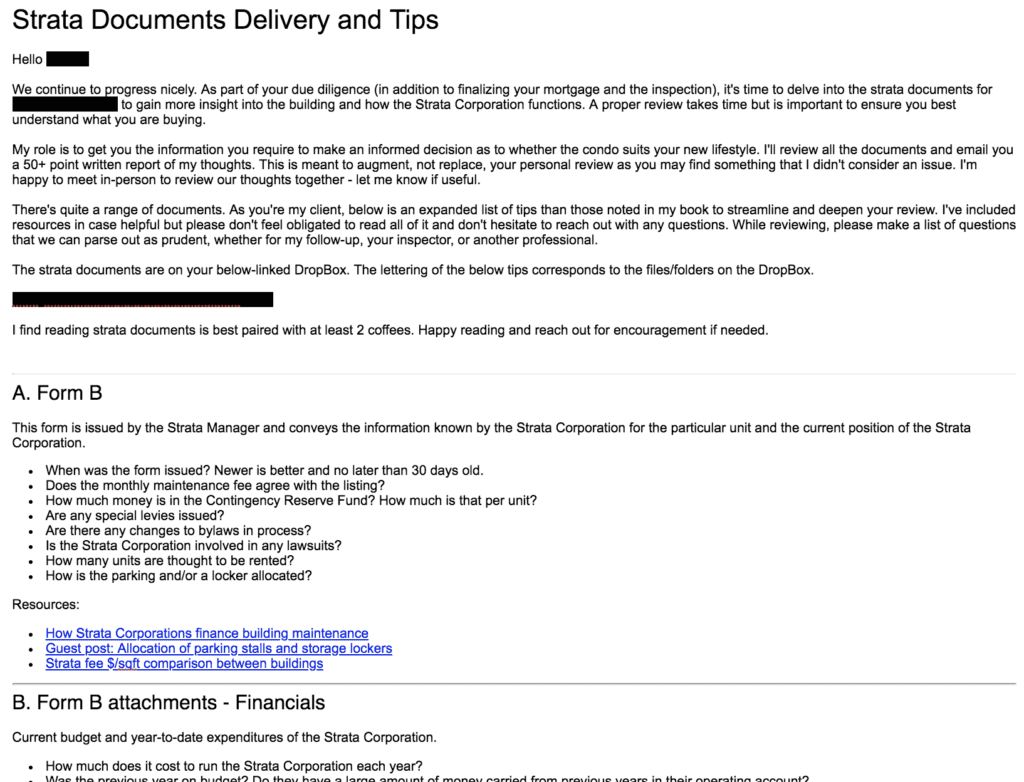Critical due diligence and how your realtor should help ensure the condo is right for you

There’s a fair amount of work required in finding the right home but it’s well worth your time given the magnitude of your investment and towards having worry-free ownership. Further cementing the worthiness of the effort is that our BC real estate system is buyer beware, you need to conduct your due diligence to ensure the condo is the right property for you.
Pages 30 and 31 of my book (link) outline all of your buying steps and greater detail on Step 5, Perform Due Diligence and Decide, starts on page 98. In reaching Step 5, you have a general understanding of the condo and have secured it by way of an accepted offer. This means the seller and you have agreed on the terms and conditions of the sale, notably the price, possession date, and what’s included in the sale. At this point, the seller is bound to the contract and you, as the buyer, have a prescribed period of time to conduct your due diligence. There are some exceptions, such as when there’s multiple offers when you may choose to perform your due diligence ahead of submitting your offer.
Although it’s a collaborative journey with your realtor, they should take the lead and walk you through the process in a step-by-step manner.
This blog post expands upon the due diligence noted in my book to highlight how your realtor should assist you. I provide this level of service to each of my clients but, if you’re using another realtor, I’ve included questions you can ask to get the service. If you need encouragement to ask your realtor for the service you deserve, check out what realtors earn (link).
Common due diligence is outlined below, namely, finalizing your financing, reviewing strata documents, having the condo inspected, and making enquiries. Your accepted offer lists the specific due diligence you will complete. If satisfied with the outcome of your sleuthing, you remove subjects and commit to purchasing the condo. If you find a red flag in your due diligence, you decline to proceed with the purchase and use the information learned to find another condo that better suits you.
Finalize your financing
Your mortgage pre-approval was based on your personal financial position. Now your lender will investigate the specific property you wish to purchase to ensure it fits their risk profile. Most buildings are fine but they can red flag buildings for issues such as being poorly maintained. To support the mortgage amount, they may require an appraisal.
It’s a good idea to reconfirm your cash will be assessable when required. Your deposit (typically 5% of the purchase price) is due around the time you remove subjects and the balance of your downpayment is due shortly before the completion date (near possession). If your downpayment is hanging on your wall as art, it’s time to gain liquidity.
Your realtor should:
- provide your mortgage professional the information and documents they require on the property
- help remedy any access issues for the appraiser
Review strata documents
Brace yourself for a small mountain of documents… strata meeting minutes, a strata plan, financials, hopefully a depreciation report… A coffee or two will help you have fun investigating the building and how the Strata Corporation functions. These documents will help you with tasks such as:
• understand what you’re buying with these tips for reviewing the strata documents (link)
• confirming the size of the condo (link)
• understanding the condition of the building and upcoming work (link)
• understanding whether the maintenance fee is adequate or if you’ll have special assessments (link)
• identifying the deductibles of the Strata Corporation insurance (link)
• understanding how parking spots and storage lockers are allocated to the condo (link)
Your realtor should:
- secure and organize the strata documents so you can easily reference them
- provide you guidance on how to best review the documents to save time and get the most useful information from them. A basic list is in my book while my clients receive a more detailed list of tips (a portion is shown below).
- provide you a written assessment of each document and an overall review. I provide each client with a 50+ point written review of the property they’re considering.
- meet with you to discuss any concerns and investigate any potential issues.
Image: Part of the expanded tips document my clients receive to streamline their work. 
Have the property inspected
A licensed home inspector provides a third-party professional opinion of the condition of the condo and building. He will inspect the interior of the condo and accessible common areas such as the roof, parking garage, and mechanical room to look for water damage, old equipment, hazards, and the general condition of the components. Unexpected major expenses are usually associated with the overall building and not what’s inside the condo.
I prefer to book inspections for after we’ve reviewed the strata documents so we have a clear list of questions for the inspector. Also, if there are any red flags in the strata documents, we can cancel the inspection instead of needlessly paying for it.
This inspection is to help you understand the existing condition and scale of upcoming work. This will enable you to estimate upcoming costs and ultimately decide whether to proceed with the condo purchase.
Your realtor should:
- attend the inspection to ensure its thorough and get a first-hand report from the inspector
- work with the seller’s realtor to coordinate access to the condo and as many common areas the Strata Corporation allows
- help investigate any questions that arise from the inspection
- ensure the inspector reviews any areas of special interest that arose from other investigations such as from the strata documents
Insurance
Securing insurance used to be a mundane part of the process but, with recent changes in the insurance industry, you should ensure the property can be insured. You should also have contingencies in place if the monthly maintenance fee rises… the main being to not overextend yourself financially and max out your mortgage.
Your realtor should:
- help you identify an insurer appropriate for the property
- provide you with the overview of the Strata Corporation insurance
- help answer the insurer’s questions about the property or building
Other pertinent investigations and summation
There may be other questions based on the specific property and your personal circumstances. There could be questions for the Strata Manager, the Strata Council, City of Vancouver, or a lawyer. You may want to confirm such things as:
• whether the view will remain (link)
• whether a renovation was done with city permits
• whether your pet will be allowed
Your realtor should:
- make investigations on your behalf or, when appropriate, connect you directly with another professional
- help you understand the overall condition of the condo and building in relation to your goals
- help you estimate the scale and schedule for potential special assessments
- step back and let you make your decision and proceed accordingly without any pressure
Title image: an inspector is using a thermal imaging camera to check for leaks in an in-floor heating and cooling system.
I hope this sheds light on your due diligence and ways to get the best service from your realtor. As always, I welcome your questions or comments via email or phone/text.
Best,

Jason Hutchison
604.314.7138 [email protected]